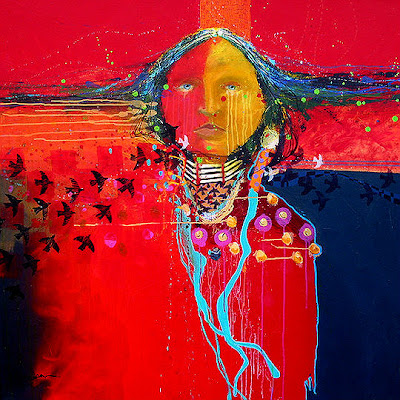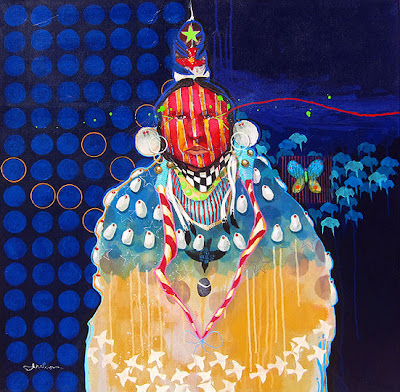By Judy Feldman |
www.wildemeyer.com
Is there a special relationship between art and spirituality? There are many reasons to think so. Art and traditional religions have always been linked – some of the greatest paintings and sculptures have had religious themes.
I think artists have always striven to express something that’s beyond the material. The “language” of art can be an emotional reaction to a beautiful landscape, a completely conceptual piece that conveys a personal message, or an image that tells a story of importance to the artist. Often, there’s a spiritual component.
 |
Ghost Shirt series #4 61"x61"
by Jim Nelson |
There are two artists at Wilde Meyer who express spirituality in very different ways.
Jim Nelson is a painter and storyteller of legends of the Lakota tribe of South Dakota. Although he is not of native heritage, Jim grew up near the Pine Ridge reservation and was friends with Lakota children. Their culture became part of him, and he has always painted their stories. Everything in Jim’s work has a meaning, expressed through vibrant colors and symbolism. He says, “I don’t just paint a person or an animal. I paint the spirit of that person or animal, and hope that the viewer will gain an understanding of this people and their culture.”
According to Jim, four primary colors represent the four sacred beings of the Lakota. Red is the highest spiritual color; blue represents the wisdom of the Sky Father; green is the Earth Mother; and yellow is the color of rocks in high places that overpower anything that stands next to them. When you look at Jim’s work, almost all paintings include these strong colors.
 |
Paint Their Face Red 30.5"x30.5"
by Jim Nelson |
For example, in the painting entitled “When Ravens Call to Her,” red is the dominant color, indicating the high spiritual nature of the woman, who has the souls and spirits of soldiers killed in battle, brought to her by the ravens who are pictured flying across her body. Jim says that these spirits are then given to the Grandfather of the North Wind (indicated by the deep blue), who puts them in the northern lights in what is called a “shadow dance.” If the eyes of this woman seem very compelling, it’s probably because Jim begins every painting with the eyes of his subject and, he says, they pull him in and dictate the course of the imagery. All of his faces are deep in thought because they are telling an important story.
 |
When Ravens Call to Her 48"x48"
by Jim Nelson |
There are many other symbols in “Bird Woman,” which depicts a healer of battle wounds. Her striped face means that she’s been touched by a grizzly bear and has his protection. The butterfly symbolizes a messenger from the Earth Mother who teaches the healer her ways. The circles on the left side of the painting represent the lodges where the tribe once lived, and the deep blue background again connotes the wisdom of the Sky Father.
 |
Bird Woman 36"x36"
by Jim Nelson |
 |
See the Medicine Hat 31.5"x26.5"
by Jim Nelson |
I asked Jim about the image of the American flag, which appears in the painting entitled “Blackbird's Day.” He said it refers to the encroachment of the white man on the Native Americans’ lands. This painting, too, has a very strong message, which is seen in the eyes of the subject; the use of the important four colors – especially red – and the symbols. The latter appeal to us because of their decorative design, but they mean so much more, once Jim explains their significance. You can certainly appreciate his work on a purely artistic level, but when you probe and learn the spirituality beyond it, these paintings become so fascinating!
 |
Blackbird's Day 30.5" x 30.5"
by Jim Nelson |
Albert Scharf takes spirituality in another direction. His series of new paintings are inspired by the Kabbalah, the study of Jewish spirituality and mysticism. Albert says about these paintings: “I think of these pieces as meditation plaques. The Hebrew letters are like antennas to me; they make me think about things that I don’t normally contemplate. The letters also have a sound that can be chanted as a meditation.”
 |
Left: Ayen Shin Lamed mixed media on canvas 20"x16"
Right: Mum Lamed Hey oil and sea shell mixed media on canvas 16"x20"
by Albert Scharf |
As I said before, spirituality and art are connected. Albert’s Kabbalah-inspired paintings, such as “Ayen Shin Lamed” and “Mum Lamed Hey” are pleasing to look at, but they invite us to go deeper and pursue their meaning.
 |
Landscapes #704 and #705 diptych
24"x24" total
by Albert Scharf |
So, to learn a little about Kabbalah, I went to the website “Judaism 101.” Here is part of the explanation on the site: “According to Kabbalah, the true essence of G-d is so transcendent that it cannot be described, except with reference to what it is not. This true essence of G-d is known as Ein Sof, which literally means "without end," which encompasses the idea of His lack of boundaries in both time and space.
I still didn’t understand the definition, so I went to
www.kabbalah.info.com. Here, it was stated: “In simpler words, there is an upper, all-inclusive force, or “the Creator,” controlling everything in reality. Some of these forces are familiar to us, such as gravity or electricity, while there are forces of a higher order that act while remaining hidden to us. Kabbalah holds the map or the knowledge of how these hidden forces are structured, and the laws by which they influence us.”
Albert also expresses his spirituality in his cloud paintings series. He says that he sees clouds as the transition state from land to the sky. “Spiritual energies are transmitted to us through the clouds. Their light affects our moods.”
 |
Landscape #715 50"x60"
by Albert Scharf |
As you can see in “Landscape 715” (yes, he numbers his paintings and has done nearly 800), the clouds pull us into the painting and encourage us to go to a meditative place. “Landscape 682” also conveys the importance of color to Albert. He does not use local color, but prefers to select saturated hues that he says are the emotional content of his art. “If I can get people to experience an emotion, they can raise their consciousness to a higher level.”










